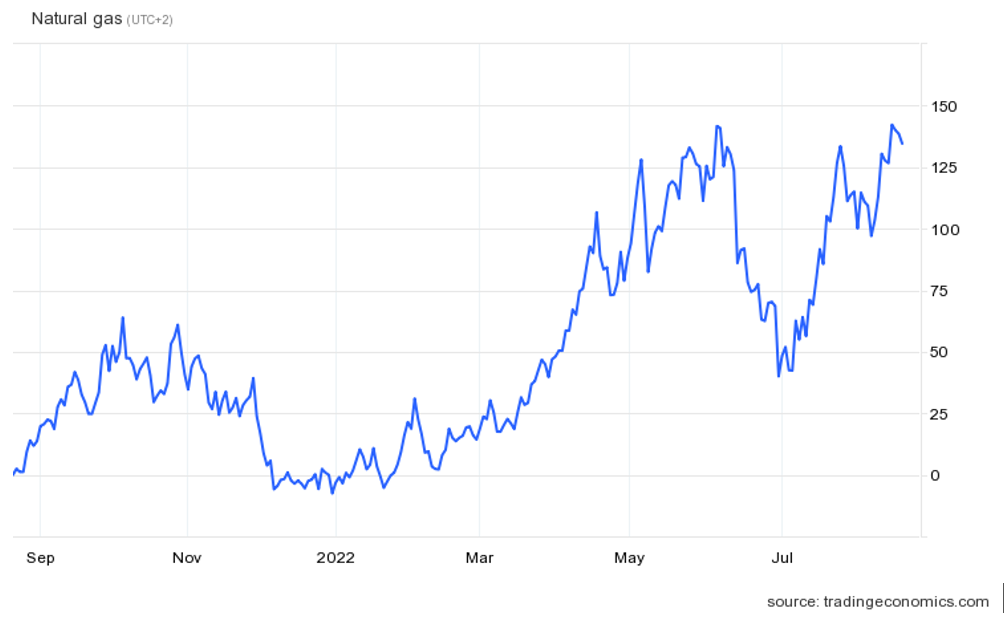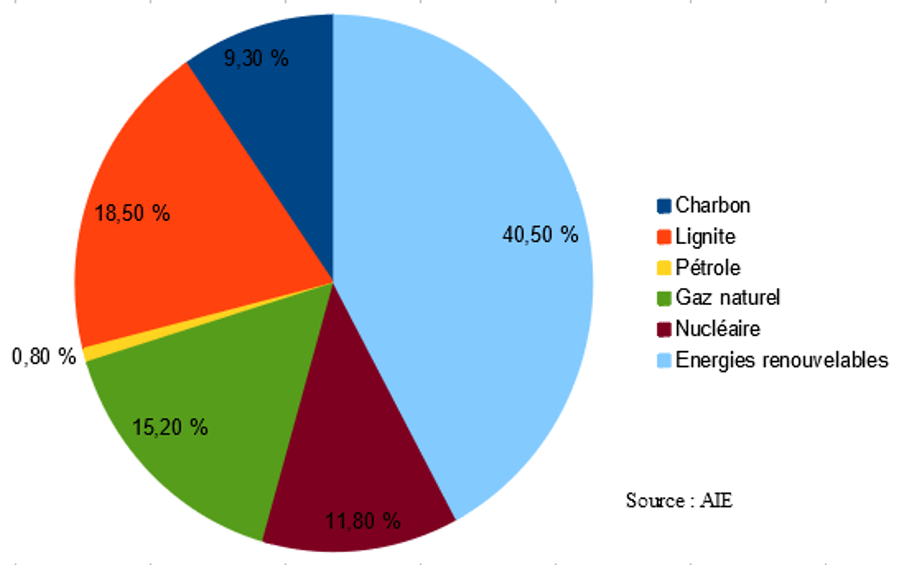By Gauthier HORDEL of La Riposte
It has become obvious to everyone that energy is at the centre of conflict. Since 2021, its price has increased considerably.
We explained in a previous article in La Riposte the reasons for its surge: rising demand with the resumption of world production, although moderate, supply problems due to faulty extraction and transport infrastructures due to a lack of parts to maintain them in operational conditions, speculation by capitalists, etc.
The war in Ukraine is not the cause of energy price inflation, it only exacerbates the phenomenon. The energy tycoons, as capitalists, are profit-seeking opportunists. For the capitalists, the conflict in Ukraine is an opportunity to speculate on prices, to get richer. Their greed fuels the inflationary spiral, degrades living conditions for a large part of the population and others are plunged into the barbarism of war.
The gas sector is for Europeans the one that is most under pressure. Before the conflict, Europe was 40% dependent on imports from the Russian company, Gazprom. For some countries like Germany the dependence rose to more than 55%.
Both sides are waging an economic war
In the war between the Russians and Ukraine and Western countries by proxy, the question of gas has become a major issue. Russian gas exports to the West have come to a complete halt. On the one hand, the West castigates Putin, and piles up economic sanctions in the hope of weakening Russia, but on the other remained dependent on its gas and find themselves today in an embarrassing situation.
Productive infrastructure is dependent on gas to a certain extent, with differences depending on the country. The idea that “we have to stop importing Russian gas so as not to finance the war” is put out to put a good face on things, but it masks the fact that the West has always defended the interests of capital, and that has involved importing Russian gas for decades.

Without energy, there can be no production. The decrease in available energy stocks for a country means a decrease in the productivity of business, an economic downturn and consequently a decline for that national capitalism. The Russian government is playing on this sensitive chord, by reducing gas exports to the West. However, they have to find new outlets to secure revenue. Both sides are waging an economic, as well as a military war to weaken the other.
The German dependency on Russian gas
In this “little” game of economic warfare between Russian and West European capitalism, it would seem that the latter is the loser in the medium term. Of the EU members, Germany is among the most reluctant to impose tougher economic sanctions on the Russians, particularly on gas on which they have had a strong dependence on Russia.
The fact that Gazprom has reduced its exports to Germany, which only receives 20% of its usual imports, has forced Germany to ration it. Gas plays a key part in the operation of German industry, which is the most powerful in Europe. A weakening of its industry would contribute to a downturn in its economy, something which has become almost inevitable at this stage.
Germany proposed a ‘rationing’ system across Europe
Gathering at the end of July, EU member states sought an energy-saving plan in the event of a complete shutdown of Russian exports. Although Germany pleaded for European solidarity for the sharing of gas, on the pretext that a fall in their economy would have repercussions on all the countries of the Union, this policy was not adopted by all the members.
But it is interesting to observe the means by which the political leaders and capitalists of Germany have sought to maintain their economic supremacy over Europe. The Greeks will remember the German ‘solidarity’ that bled them white during the debt crisis in the 2010s, by imposing draconian and inflexible measures on Greece, of which the youth and the workers were victims.
Germany is paying a high price for its past energy strategy, particularly in terms of electricity production, which has led it to the impasse in which it finds itself today. When Germany decided to break with nuclear energy in favour of renewable energy, mainly wind turbines, for electoral reasons, it became more dependent on fossil fuels.
Renewable energy sources like wind and solar are intermittent and uncontrollable. That is to say, they do not produce electricity continuously. The load factor of a wind turbine, for example, is on average 25%: it produces electricity only 25% of the time. The other problem is that at this stage we do not know how to store electricity in large quantities, economically.
To overcome these problems, renewable energy production methods have had to operate in parallel with coal, lignite or gas-fired power stations or nuclear power stations to get continuous electricity. The current level of development of society is based on abundant and continuously available and energy. The choice of the German leaders, therefore, was to use coal, lignite and gas as a controllable means with nearly 55% of its electricity production.
‘Transition’ energy that will last a long time.
The capitalist economy being a competitive economy, the gas lobby looked favourably on Germany’s anti-nuclear turn in favour of renewables, which offered it good prospects for development in the country due to the constraints mentioned above. It must be understood that in the production of electricity, nuclear power and fossil fuels, in particular coal, lignite and gas, are two sectors dominated by capitalists, who are waging a war to monopolize market shares.
Incidentally, Germany’s strategy has not significantly reduced its carbon impact in terms of electricity production. The amount of CO2 emitted per KWh of electricity produced in 2021 is 414g. Although Germany is making efforts in renewables, this figure has stagnated for years (390gCO2/KWh in 2017).

By way of comparison, France, which has a production strategy based on nuclear power (which has other constraints) only emits 53gCO2/KWh, or 8 times less than Germany. At the beginning of 2022, under pressure from Germany, the European Commission classified gas as “green energy” on the pretext that it is a transition energy, a transition that is likely to last for a very long time.
What prospects for European countries
In the context described, the United States offers an alternative gas supply. The war in Ukraine has given the US the opportunity to export shale gas, an extraction technique which is highly criticized for its impact on the environment. By doing this, US capitalism will increase its grip on European capitalism and generate additional profits along the way.
Recently, France concluded a contract for the supply of diesel with the United Arab Emirates, which is not distinguished either by its democracy or by its pacifism. It is a flagrant demonstration, but in no way surprising, that behind the fine words of democracy and environmental protection, everything is conditioned by economic interests.
Gas stocks are only at 66%, but to guarantee winter consumption, it would have to be at 80% to counteract a net cut in supply. This is the reason why the European Union is seeking to establish a plan for rationing and saving energy. What seems inevitable is that the lack of supply will decrease production capacities, increasing costs and accelerating economic crisis.
Governments will face social crises
This interrelationship between energy consumption, global warming and economic prosperity undermines the myth of ‘green’ growth. The behaviour of each separate state demonstrates how dependent it is on energy. The economic interests and privileges of the capitalist class are more powerful than anything else.
For capitalism, it is not conceivable that any restrictions in production can slow down the profits. But if restrictions were to be applied, they can only be the result of a lack of available energy. For them, the fight against greenhouse gas emissions is not a sufficient reason to impact capitalist profits.
The economic basis of capitalism and its political superstructure are in contradiction to the need for a system of production that is compatible with either environmental considerations or the available resources.
On the basis of capitalism, the energy problems will find no solution. The energy crisis, the decrease in resources and the increase in prices, will be superimposed on inflation and contribute to the deterioration of living conditions. Governments will face social crises and they are preparing for them.
This is based on an article in the French Marxist journal, La Riposte, and the original can be found here



